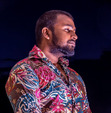Gaveem's Blog
August 31, 2025
When Stories Start Speaking for You
Reflecting on my creative shift of genres, from personal writing to fiction that spans history and speculative futures.
It’s been a while since I’ve published my writings. In fact, it’s been a little under 2900 Days since I wrote my first and only post on Medium. Writing has always been quite personal for me, and I often wrote to understand myself. Writing is a cathartic process, and while very few relatable thoughts end up getting published, what doesn’t make the cut often ends up being spoken through the mouths of the characters in the stories that I write.
For a long time, my creative work was rooted in reflection. I explored emotion, resilience, and the quiet ways people rebuild after loss. It was personal, intimate, but also quite freeing. But something shifted. Not suddenly, not dramatically — but like a tide that changes direction while you’re watching the horizon, in those waves that build up in groups of seven to drench us as we naïvely sit far too close to the edge.
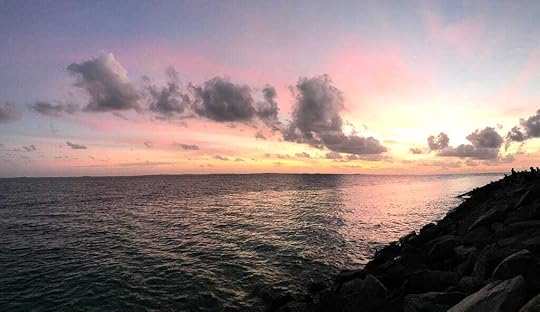 And it took me only a few times of getting wet to the bone to learn not to sit there.
And it took me only a few times of getting wet to the bone to learn not to sit there.If what I write about myself is relatable, then there must have been and there will be people who had and will have similar experiences elsewhere, and elsewhen.
Elsewhere is not that hard to imagine in this day and age. Just open up Google Maps and you can literally be on the street in Paris. But it’s harder to imagine elsewhen.
2900 days is a lot of time. I published and unpublished a book. A pandemic happened. The world is on the edge of impending war. I changed jobs and my friend circle shrunk a few times to less than a handful, if that’s a thing. I approached my 40th with the uneasy feeling that I have very little to show for what I’ve done all this time.
No, wait… I probably have too much. Too much unpolished stuff, but nothing that’s done to my satisfaction.
I‘ve written a lot but I stopped publishing. Not even tweets made it out. I just didn’t think my commentary on the things I found interesting — post-worthy — was worth the time it takes to craft it into a narrative that would fit an audience. Or, rather, I became a bit more cautious of what my thoughts mean and how they’re interpreted. I’ve since learned that it isn’t possible to craft something that can only be interpreted in the way I intend it to be. People experience things through the filter of the sum of the knowledge they’ve gathered through their lived experience.
Narratives shape reality… words do matter (that’s the brand of my English coaching sessions, by the way). It was Socrates who said, “The misuse of language induces evil in the soul.” In Islam, we are taught to guard the tongue lest it draws us into evil.
So I stopped writing for a while and read, studied, researched. I started from books about the process of writing and editing. Then I expanded into almost every genre of books. At some point though, I felt that I had to start from the beginning, so I went with the history that I learned in school… and then the history that I didn’t learn in school.
I read, like for a few years, from many dusty tomes, books that people have forgotten, books that were withdrawn from public circulation for political reasons, journals that didn’t have a wide circulation, rare books, and books that were banned for inciting revolutions or because they’re simply destructive.
And I made notes… a lot of notes. First of all, collecting these old books is an adventure of its own. Some of them turned up in the most unexpected places.
Being someone who’s almost always living away from home, my challenge was finding digital copies of these books. I didn’t want to have to carry around tons of books. I have always loved the convenience of digital books. And I always thought that people who insisted on paper books simply loved the books and not the reading. And annotating.
Without having written anything solid like a complete post — or an Instagram caption — I have enough notes and cross-referenced so many books that it would take a very long time to edit and draft into the skeletons of stories that I pulled out of life, out of current events, out of the vivid dreams that I have.
Narratives… shape reality. Memories can be altered. Voices can be weaponized. We’ve seen it play out over the last three years on the global stage.
How we interpret these perspectives are key to understanding why our reality is the way it is. Reality can have a completely different meaning in alternative interpretations. And there are quite a few stories that don’t have a narrative, that weren’t written, that aren’t told.
So I started listening differently. To history. To silence. To speculative questions that don’t have easy answers. And I read alternative history, of the history that wasn’t written by the victorious. The history of the silenced, of the downtrodden.
What if a culture erased by colonization found its voice in a parallel timeline? What if multi-generational sorrow could be mapped like the constellations across the heavens? After all, our constellations have ancient stories behind them, hidden behind their names.
These are the kinds of stories I’m writing now. Fiction that blends emotional truth with historical texture and speculative design. Stories that ask not just “what happened?” but “what could have happened?” and “what might still?”
That’s the strange beauty of fiction. It gives emotions a disguise, questions a voice, and memories a new perspective. Stories sometimes speak the truths we’re not ready to say aloud.
I’ve never stopped writing, but I gave it time and space to breathe and grow into stories that stretch beyond personal reflection. Stories rooted in history, in imagined futures, in the quiet revolutions that unfold across time and space, with characters who live in forgotten eras or speculative worlds, who carry emotional truths that feel deeply familiar.
Crafting stories about the systems that shape us — whether we live in a remote island in 1850 or a space colony in 2150 — led me to historical fiction and science fiction, genres that allow me to explore identity, transformation, and cultural memory on a broader canvas.
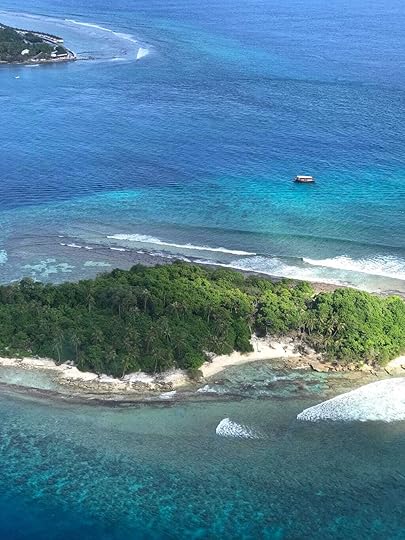 For instance, Maldivians would have been outnumbered by coconut trees by a huge margin, unlike now.
For instance, Maldivians would have been outnumbered by coconut trees by a huge margin, unlike now.I’m not abandoning reflection. I’m expanding it. I’m not leaving behind emotional clarity — I’m simply giving it new landscapes to live in.
Some of my upcoming stories will take place in centuries past, others in futures not yet born. But all of them will carry the same thread: a search for clarity, for meaning, for the quiet truths that often go unnoticed.
So if you’ve read my past works, thank you. And if you’re just arriving, welcome. This is a new chapter — one that spans timelines, but always returns to the heart.
Let’s see where the stories take us.
[image error]October 25, 2017
1300 Days of Laamu
I first came to Laamu almost 10 years ago with the British Red Cross as a community mobiliser in Isdhoo. I was 22, and had gone through a major upheaval in my life. I had freshly left a four-year career in aviation, somewhere I always wanted to work in, as a kid.
I also left behind a very sheltered life in Malé.
I was one of those individuals who would have never given two thoughts about how people lived their lives in islands outside of the capital of Maldives, mainly because back then, I had not traveled to the islands so much to have an idea of what it’s like.
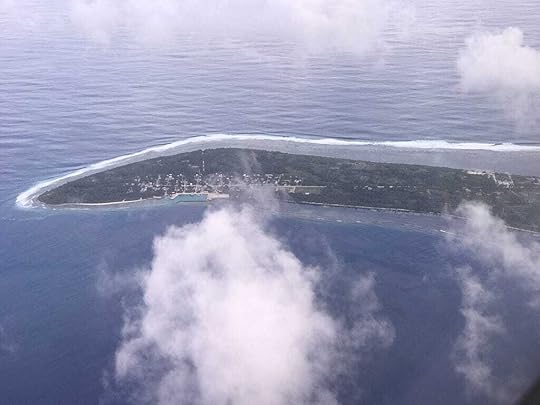 Isdhoo: the northern tip of Laamu Atoll
Isdhoo: the northern tip of Laamu AtollSo Laamu, particularly Isdhoo, was a shock to me, because I missed all of the things I took for granted. Basic needs like proper waste management, fresh running water, and transport, and things that I don’t even have to think about, like electricity. I got used to being electrocuted daily, by touching the metal surface of the laptop that I was supposed to work on.
I never owned a motorbike in Malé, because I loved walking. But walking in Isdhoo was not very practical because it’s pretty big, and entire swaths of it is just fields and coconut trees; you wouldn’t want to be in between Isdhoo and Kalaidhoo after dark.
It’s about the same in Gan and Fonadhoo. These are amongst the largest islands in the Maldivian archipelago. Also, every time I go to Malé, everyone is surprised that I am still alive while living in Laamu Atoll, because of a reputation that the people are hard to deal with.
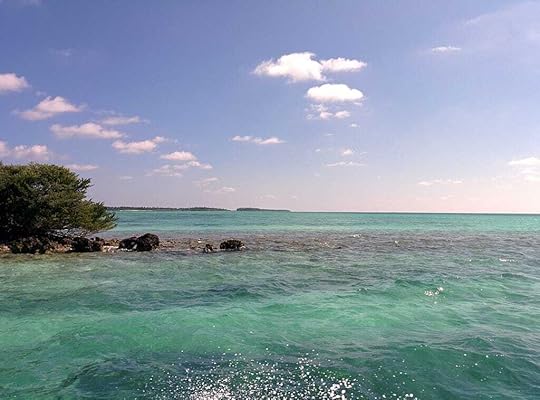 Doesn’t do justice, really.
Doesn’t do justice, really.I still remember the exact moment that I fell in love with Laamu.
It was a beautiful morning, the sea was almost a mirror the day that I arrived, the speedboat skimming the gleaming, impossibly saturated turquoise waters and zooming past the tiny little islands that line the channel cut into the Isdhoo lagoon.
Every time I pass through that channel, I am taken back to that first memory.
I desperately wanted to see the rest of the islands in Laamu, but only got to visit Maabaidhoo and Fonadhoo, and I soon had to change to Buruni in Thaa Atoll. From there, I moved back to Malé once my assignment was over, and went on to explore other atolls.
But you know, I have to tell you, not even in my wildest dreams did I imagine that I would be coming back to Laamu.
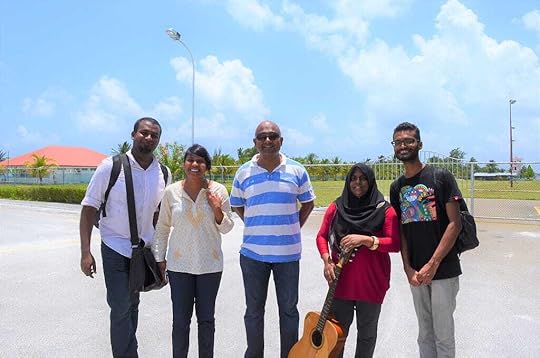 My beloved team, just out the airport on the 3rd of April, 2014.
My beloved team, just out the airport on the 3rd of April, 2014.When I first heard about the LECReD programme for Laamu, I was thrilled. I was so lucky to have been selected, and had flown down on a warm, sunny day on the 3rd of April in 2014 with my team, a rare collection of experienced, talented people.
Over the years, contracts had ended and some people chose to move on, and only myself and my boss had stayed on.
Today, the 25th of October, 2017, is the 1300th day that we have been here.
It had not been an easy 3 and half years. Although I made friends easily, I missed the life I left behind in Malé, I missed my closest friends… but most of all, I also missed so many things I took for granted.
Like for example, having the option to hail a cab without having to pay a minimum of MVR 150. Or having an endless choice of restaurants to go to. Or not having to pay flight tickets every time I need to get new glasses.
It’s been 10 years since I first came to Laamu, and yes, things are different from what it used to be a decade ago. You might not have seen many big projects… that was one of the most frequently asked questions about our being here.
But I personally believe our work here has made a difference, because we have laid a very strong foundation of skills and guidelines for evidence based planning for the future.
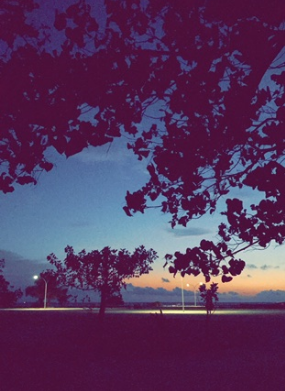 Dusk at Mukurimagu Harbor
Dusk at Mukurimagu Harbor1300 days later, I no longer miss the capital. Not because there are more restaurants, or gyms or opticians, or that there are cheaper taxis. There aren’t. I don’t miss Malé City, because the benefits of being in Laamu outweigh any convenience that I felt back in Malé.
Simply, I have fallen deeply in love with the peace and quiet of Laamu. I am amazed with the open hearted love that you will never experience in any other atoll of the Maldives. I think that is what makes people so wary of the people from Hadhunmathee Atoll.
The people of Laamu are not afraid of being frank, honest and open hearted, and that might be a bit uncomfortable to the people of Malé because the city folk are more reticent.
Which probably is why I feel so much at home in Laamu. Yes, this atoll is exquisite in all its natural glory, but it is the people that makes Laamu truly magical.
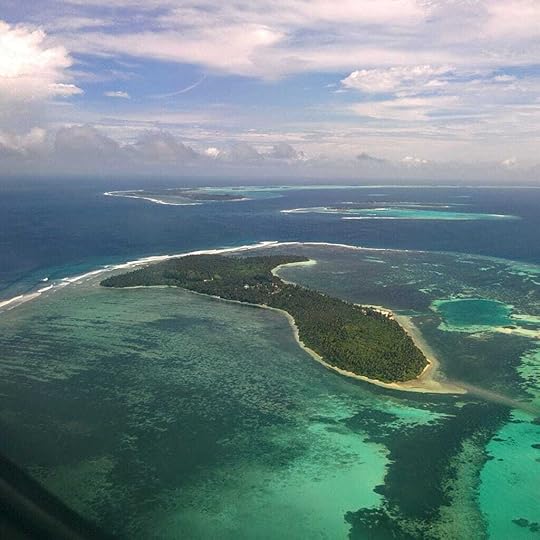 Flying over Gaadhoo, and in the background, the southern reef of Laamu stretches toward the horizon.
Flying over Gaadhoo, and in the background, the southern reef of Laamu stretches toward the horizon.To my team, even though most have moved on: you are the creme de la creme of talented persons I have had the privilege to work with, in the field. Not only are you all vastly skilled, you all have been amazing company, and I have learned so much from all of you.
To my colleagues in Malé and abroad, and those who have left the programme after their term had ended, it has always been a pleasure to be the face of all your hard work, to accept platitudes on your behalf, and also to listen to concerns. To watch all your work come to life in front of our eyes, it is again, a privilege. To see a change, over months, over years… there aren’t words to describe it.
I just want to tell all of you, thank you.
You all mean a lot to me, to have shared laughter, to have had a lot of fun, to have been there through the tears. And even though we had all those intense debates, we all have done a lot of good work, to reach an intangible yet very real goal.
To the people of Laamu… I can never erase this life-changing experience. I gave you the best years of my youth, and in return, you have made me a man. I will always be in awe of the kindness and love that you all have given me. Of all the patience. Of all the beautiful memories.
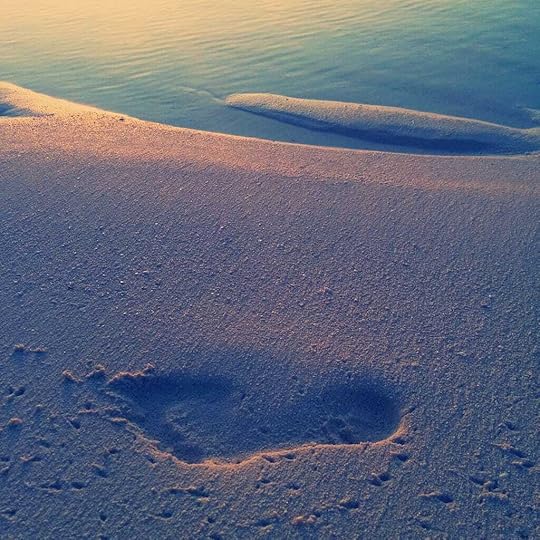 Dawn at Munyafushi
Dawn at MunyafushiI am leaving Laamu in 5 days, and the entire month of October I have been outside at the harbor trying to package the peace and quiet in my heart, and engrave in my mind the wonderful company of a lot of people from every walk of life, each in their own story, on their own journey.
I am glad to have been a part of your lives. I am glad we have crossed paths. And I know that even as I leave to write my own life and to continue on my own journey, like the tides that bring back the sea, I too, will always come back to my Laamu family.
[image error]
